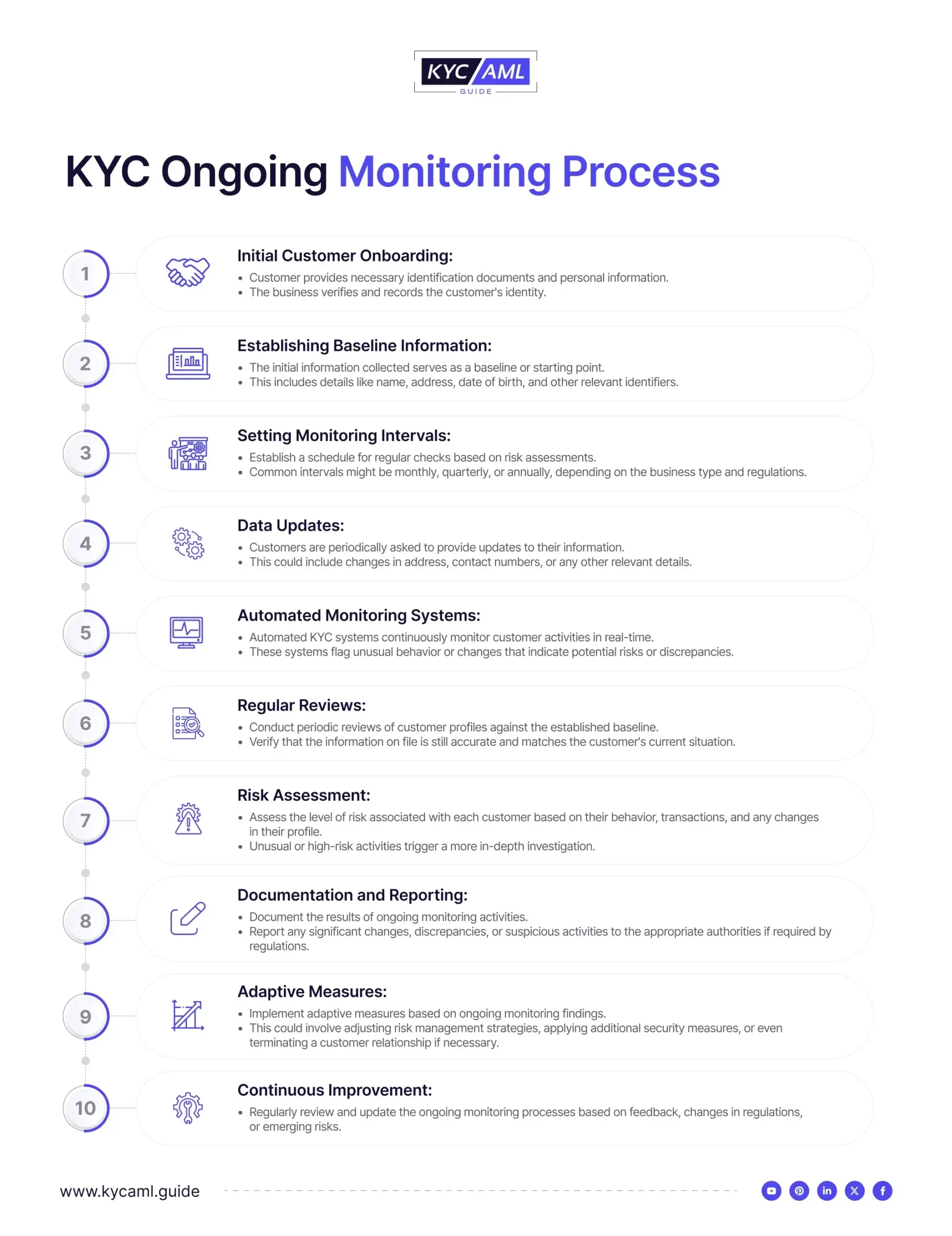What is KYC Ongoing Monitoring?
KYC stands for Know Your Customer which is the process of identifying customers and safely onboarding them. KYC Ongoing Monitoring is a process in KYC that keeps the Customer Identities and information up to date and flawless. A business or a financial institution needs continuous monitoring because customer information can change over time. For example, change in address, marital status, disability, or even death. These information sets necessarily require regular checks and updates through Ongoing Monitoring to help the KYC systems properly identify and verify their customers.
How KYC Ongoing Monitoring Works?
Ongoing Monitoring is an iterative and imperative process. Look at the process shown below:

Benefits of KYC Ongoing Monitoring
1. Reduced Fraud and Money Laundering
Through Continuous Monitoring of onboarded customers’ activities, and transactions, it is easier to detect money laundering and fraudulent activity. This helps in protecting authentic customers from fraudulent activities and money laundering risks.
2. Enhanced Customer Satisfaction
User journey is an important aspect of seamless customer onboarding. Ongoing Monitoring helps in maintaining a certain level of customer base by ensuring security, and integrity and prioritizing authentic customers in services.
3. Improved Reputation
Financial businesses can enjoy improved reputation with ongoing monitoring and reporting. This reputation is both in the eyes of customers and the regulatory authorities. This ultimately creates a brand worth and helps firm grow their businesses.
4. Reducing Operational Costs
Ongoing monitoring enables financial businesses to reduce investments in streamlining their operations related to customer onboarding. When customer identities are regularly updated and monitored, the cost of onboarding a new customer becomes less because of previously learned patterns through AI (Artificial Intelligence).
5. Compliance with AML Regulations
Ongoing monitoring is a crucial part of KYC Solutions that ensures compliance with the AML (Anti-Money Laundering) regulations. It helps the implementation of the latest regulatory updates in the KYC procedures.
Regulators of KYC Ongoing Monitoring
FATF (Financial Action Task Force)
In November 2023, FATF updated its recommendations on combating Money laundering and Terrorism Financing. According to these recommendations, the preventive measures for businesses to mitigate financial crime risks include:
- Customer Due Diligence & Record Keeping requires firms to conduct enhanced ongoing monitoring.
FCA (Financial Conduct Authority)
Firms must conduct ongoing monitoring of their corporate relationships to assess risks. Ongoing Monitoring involves reviewing transactions to ensure consistency with the firm’s knowledge of the customer and keeping information up to date. If doubts arise about the accuracy of previous customer data, the firm must apply Customer Due Diligence (CDD) measures. Enhanced ongoing monitoring is required when the risk associated with a business relationship increases, as outlined in FCG 3.2.9G.
How Customer Due Diligence Impacts KYC Ongoing Monitoring?
Customer Due Diligence (CDD) is crucial for carrying out Continuous Monitoring of transactions. Firms can adapt their KYC monitoring efforts based on evolving business practices and relationships with customers. If the risk level of customer’s activities, profiles, and transactions increases, Enhanced Due Diligence is required. This includes thorough monitoring with stringent checks.
Also Read: AML Ongoing Monitoring for Small Businesses
The Role of Identity Verification Solutions in Ongoing Monitoring
KYC Identity Verification Solution Providers play a critical role in carrying out Ongoing Monitoring for businesses. They have the necessary teams, tools, and technologies to properly conduct the monitoring activities. For instance, KYC Solutions for banks are implemented not only to carry out identity verification but also to monitor the onboarded identities.
KYC Vendor Analysis is a well-researched Identity Solution provider list that can help businesses rationalize their KYC Tool Selection.





